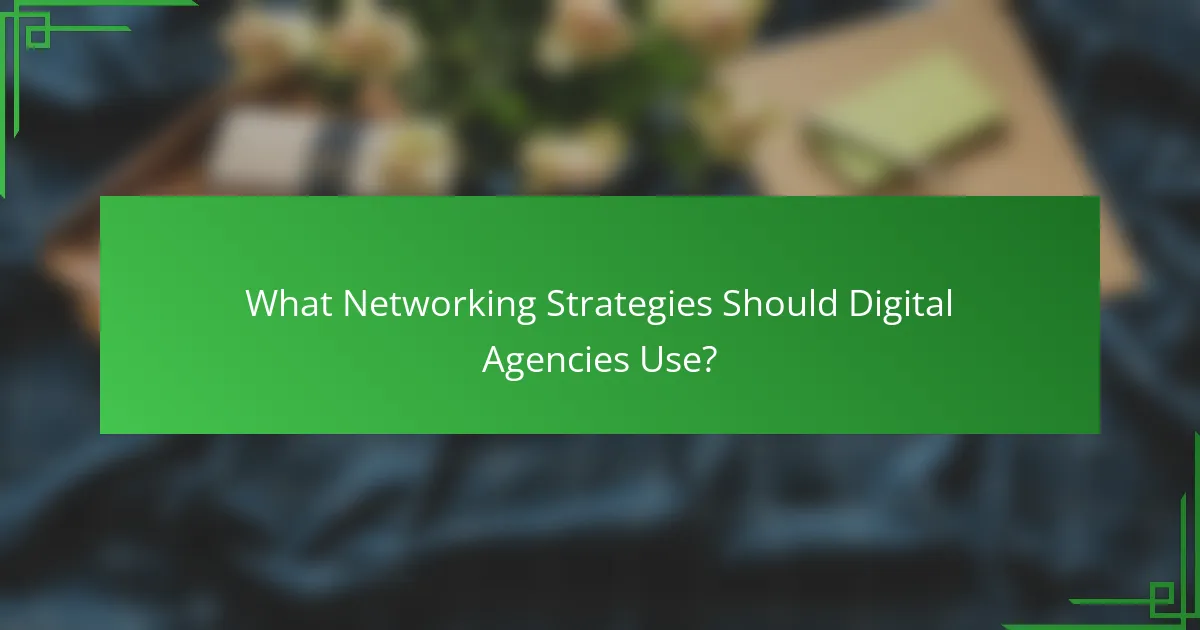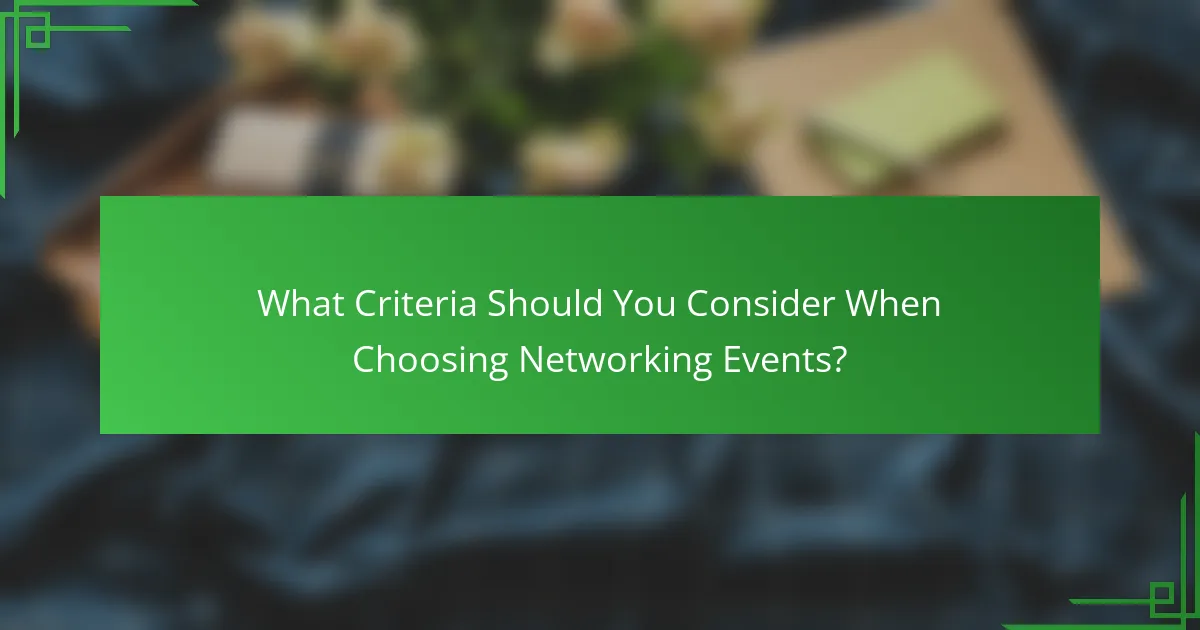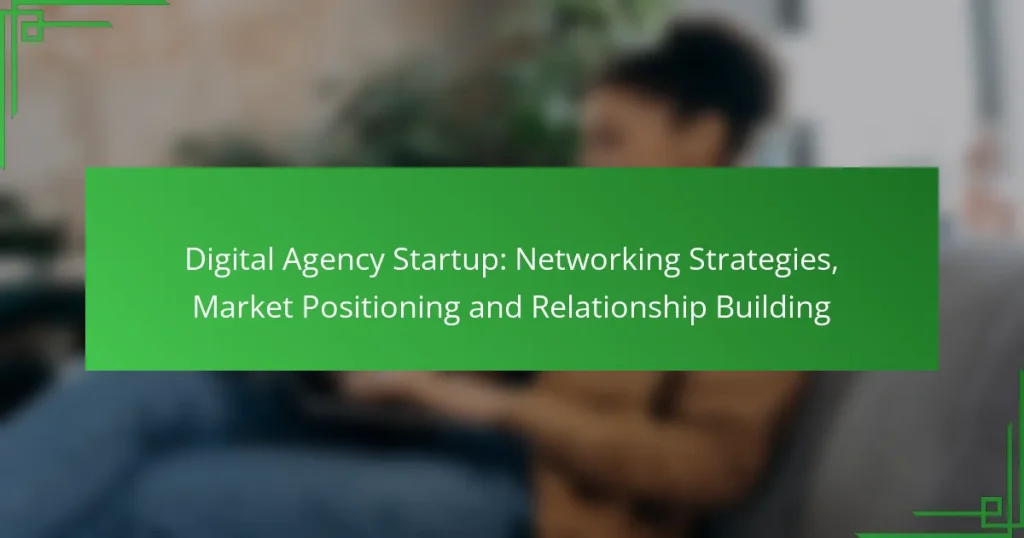In the competitive landscape of digital agencies, leveraging a blend of online and offline networking strategies is essential for establishing valuable connections and enhancing market positioning. By clearly defining your target audience and unique value proposition, you can effectively differentiate your services and attract the right clients. Additionally, prioritizing relationship-building through consistent communication and trust fosters long-lasting partnerships that drive growth and collaboration.

What Networking Strategies Should Digital Agencies Use?
Digital agencies should employ a mix of online and offline networking strategies to build valuable connections and enhance their market positioning. Effective networking can lead to new clients, partnerships, and industry insights that are crucial for growth.
Leveraging LinkedIn for Connections
LinkedIn is a powerful platform for digital agencies to connect with potential clients and industry peers. Creating a professional profile that highlights your agency’s services and expertise can attract attention from decision-makers.
Engaging with content relevant to your niche, joining industry-specific groups, and participating in discussions can further enhance your visibility. Aim to connect with at least a few new professionals each week to steadily grow your network.
Attending Industry Conferences
Industry conferences provide an excellent opportunity for digital agencies to meet potential clients and partners face-to-face. These events often feature workshops, panels, and networking sessions that can help you showcase your expertise and learn from others.
When attending, prepare by researching attendees and creating a list of key individuals you want to meet. Follow up with new contacts after the event to solidify relationships and explore collaboration opportunities.
Participating in Local Meetups
Local meetups can be a great way for digital agencies to connect with nearby businesses and professionals. These informal gatherings often focus on specific topics, allowing you to share knowledge and learn from others in your community.
Look for meetups in your area that align with your agency’s services or interests. Regular attendance can help establish your agency as a trusted local resource, leading to referrals and partnerships.
Utilizing Online Communities
Online communities, such as forums and social media groups, can be valuable for digital agencies seeking to network. Engaging in discussions, answering questions, and sharing insights can position your agency as an authority in your field.
Identify platforms where your target audience congregates, such as Facebook groups or Reddit forums, and contribute regularly. This consistent engagement can lead to meaningful connections and potential business opportunities.
Building Referral Partnerships
Establishing referral partnerships with complementary businesses can significantly enhance your agency’s reach. By collaborating with firms that offer different services, you can refer clients to each other, creating a mutually beneficial relationship.
Consider reaching out to local web developers, graphic designers, or marketing consultants to discuss potential partnerships. Formalizing these relationships through agreements can help ensure that both parties benefit from the collaboration.

How to Position Your Digital Agency in the Market?
Positioning your digital agency in the market involves clearly defining your target audience, unique value proposition, and brand identity while understanding your competition. This strategic approach helps you differentiate your services and attract the right clients.
Identifying Target Audience
Identifying your target audience is crucial for effective market positioning. Focus on specific demographics such as age, industry, and geographic location to tailor your services. For example, a digital agency might target small businesses in the tech sector in urban areas.
Utilize surveys, social media analytics, and market research to gather insights about potential clients. Understanding their pain points and needs will allow you to create services that resonate with them.
Defining Unique Value Proposition
Your unique value proposition (UVP) sets your agency apart from competitors. Clearly articulate what makes your services distinct, whether it’s specialized expertise, innovative solutions, or exceptional customer service. A compelling UVP can significantly influence a client’s decision to choose your agency.
Consider crafting a concise statement that highlights your strengths. For instance, “We deliver data-driven marketing strategies that increase ROI for e-commerce businesses.” This clarity helps potential clients quickly understand the benefits of working with you.
Conducting Competitive Analysis
Conducting a competitive analysis allows you to understand your market landscape. Identify key competitors, their offerings, pricing strategies, and market positioning. This information helps you spot gaps in the market and opportunities for differentiation.
Create a comparison table to visualize strengths and weaknesses. For example, compare service features, pricing tiers, and client testimonials. This analysis will inform your strategy and help you position your agency effectively.
Creating a Strong Brand Identity
A strong brand identity is essential for market positioning. Develop a cohesive visual and verbal identity that reflects your agency’s values and mission. This includes your logo, color scheme, typography, and tone of voice in communications.
Ensure consistency across all platforms, from your website to social media profiles. A recognizable brand fosters trust and loyalty, making it easier for clients to choose your agency over others.

What Are Effective Relationship-Building Techniques?
Effective relationship-building techniques focus on consistent communication, delivering value, and fostering trust. These strategies help digital agencies create long-lasting connections with clients and partners, ultimately enhancing collaboration and business growth.
Regular Follow-Ups with Clients
Regular follow-ups with clients are essential for maintaining engagement and demonstrating commitment. Schedule check-ins at consistent intervals, such as bi-weekly or monthly, to discuss project progress, gather feedback, and address any concerns.
Utilize various communication channels, including emails, phone calls, or video meetings, to keep interactions fresh and personal. Tailor your approach based on client preferences to strengthen the relationship further.
Providing Value Through Content
Providing value through content involves sharing relevant insights, tips, and resources that benefit your clients. Create informative blog posts, whitepapers, or newsletters that address industry trends and challenges, positioning your agency as a knowledgeable partner.
Consider hosting webinars or workshops to engage clients directly and showcase your expertise. This not only builds trust but also encourages clients to view your agency as a valuable resource.
Establishing Trust Through Transparency
Establishing trust through transparency means being open about your processes, pricing, and project timelines. Clearly communicate your methodologies and any potential challenges that may arise during a project to set realistic expectations.
Encourage honest feedback and be receptive to client concerns. This openness fosters a collaborative environment where clients feel valued and understood, strengthening the overall relationship.

What Criteria Should You Consider When Choosing Networking Events?
When selecting networking events, consider factors such as relevance to your niche, the profiles of expected attendees, and the event’s format. These criteria will help ensure that the connections you make are valuable and aligned with your business goals.
Relevance to Your Niche
The relevance of an event to your niche is crucial for maximizing networking opportunities. Look for events that focus on your industry or target market, as this increases the likelihood of meeting potential clients and collaborators. For example, a digital marketing agency should prioritize events centered around technology, marketing trends, or entrepreneurship.
Evaluate the topics covered and the speakers featured at the event. If they align with your services or interests, it’s a good indicator that the event will attract like-minded professionals. Attending niche-specific events can lead to more meaningful conversations and partnerships.
Expected Attendee Profiles
Understanding the expected attendee profiles helps you gauge the potential value of networking at an event. Research who typically attends, including their roles, industries, and levels of experience. This information can often be found on the event’s website or through past attendee testimonials.
For instance, if you are looking to connect with decision-makers, prioritize events that attract executives or senior professionals. Conversely, if your goal is to mentor or collaborate with startups, seek out events that cater to entrepreneurs and emerging businesses.
Event Format and Structure
The format and structure of an event can significantly impact your networking experience. Consider whether the event includes workshops, panel discussions, or informal networking sessions. Each format offers different opportunities for engagement and connection.
For example, workshops may provide hands-on experience and deeper discussions, while informal networking sessions allow for casual interactions. Choose events that offer a mix of formats to maximize your chances of making valuable connections. Additionally, check if there are opportunities for one-on-one meetings or breakout sessions, as these can facilitate more personal interactions.

How to Measure the Success of Your Networking Efforts?
Measuring the success of your networking efforts involves tracking specific metrics that reflect your outreach effectiveness. Focus on lead generation, engagement levels, and conversion rates to gain a comprehensive understanding of your networking impact.
Tracking New Leads Generated
To effectively track new leads generated from your networking activities, maintain a detailed log of contacts made during events, meetings, or online interactions. Utilize customer relationship management (CRM) tools to categorize and monitor these leads over time.
Consider setting a target for new leads each month, aiming for a reasonable increase based on your previous performance. For instance, a growth of 10-20% in new leads can indicate successful networking efforts.
Assessing Engagement Levels
Engagement levels can be assessed by monitoring interactions with your content and responses to your outreach. Track metrics such as email open rates, social media interactions, and attendance at events to gauge how well your audience is connecting with your brand.
Utilize surveys or feedback forms to gather qualitative data on how engaged your contacts feel. Aiming for a response rate of around 20-30% can provide meaningful insights into your networking effectiveness.
Evaluating Conversion Rates
Evaluating conversion rates is crucial to understanding how many leads turn into actual clients. Calculate the percentage of leads that result in sales or contracts, and compare this with industry benchmarks to assess your performance.
For digital agencies, a conversion rate of 5-10% is often considered healthy, depending on the niche. Regularly review your sales funnel to identify bottlenecks and optimize your approach to improve these rates.


